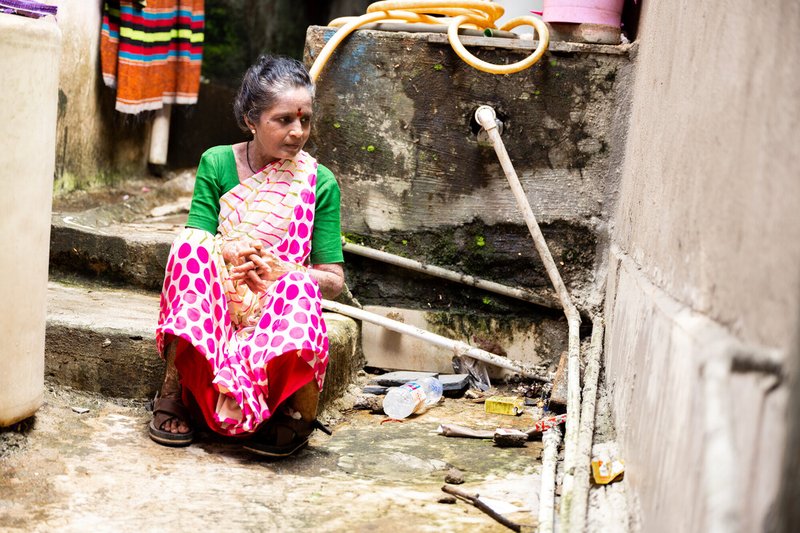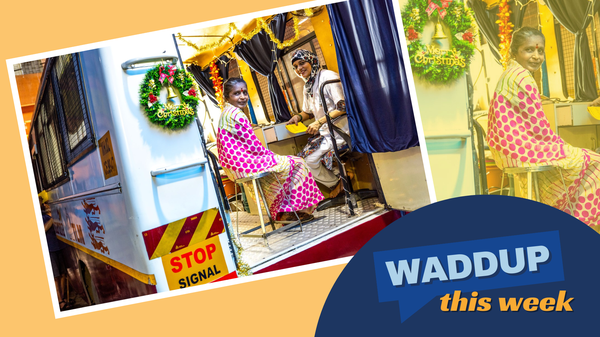'So near and yet so far to Bollywood, a welcome light in the darkness'
Peter Waddup, CEO - The Leprosy Mission Great Britain
It is wonderful to see the Christmas lights shine through the darkness at this time of year. Although we have barely crossed the threshold into winter, the long cold nights can leave even the happiest of souls feeling blue. It is such a tonic to see the darkness illuminated as our thoughts excitedly turn to Christmas. Like moths gravitating to the light, thousands of visitors are flocking to London to see the magical light displays. Whether it is Regent Street's trumpet-playing angels or the giant golden bells of Covent Garden, twinkling trees greet us at every turn.
When I see the lights flooding the darkness my thoughts immediately turn to what is one of my favourite Leprosy Mission projects! We all know that Oxford Street will be lit up like a Christmas tree from mid-November each year. And that same assurance of a welcome visiting light is felt by people living in Mumbai's biggest slums.
If you've never visited India, think Slumdog Millionaire. While Danny Boyle's masterpiece is a work of fiction, it gives a remarkably accurate portrayal of life in the Mumbai slums. The narrow streets are lined with overcrowded and cramped ramshackle homes. A lack of toilet facilities and poor sanitation mean disease and infections are rife. It's a whole sensory experience which somehow Danny Boyle manages to grittily encapsulate.
Like London, there is widening gap between rich and poor in Mumbai. In fact half the population live in slum areas that adjoin some of the city's wealthiest neighbourhoods, home to the Bollywood stars.

For people like Sonu, pictured, staying healthy is a constant struggle. Yet the lights from the Karuna mobile clinic as it turns into her Mumbai slum, brighten her world. She tells herself to not take it for granted. That the converted ambulance might not always arrive like clockwork every fortnight. But over the years she has grown to love and trust the medics on board. She knows that as long as the mobile clinic continues to run, they will care for her. Karuna means compassion in Sanskrit after all. Through the work of the ambulance, she has come to learn that her life matters.
Sonu was diagnosed with leprosy when she was just 12 years old. However, it was a long and painful journey to receiving a diagnosis. For many years she did not know what the strange, discoloured patches were that appeared on her skin. Her parents tried to protect her and kept her off school. But although they loved and cared for her, she didn't receive the one thing that would halt her condition. The antibiotic cure for leprosy.
Eventually, Sonu lost all feeling in her feet as leprosy attacked her nerves. She could no longer feel when she had cut herself and ulcers developed. These often became infected. It was at this stage she finally received the cure for leprosy. Yet devastatingly it was too late to bring back the feeling in her feet.
Because of frequent infections to her disabled feet, Sonu couldn't work. She moved to the Mumbai slums to live alongside others living with the effects of leprosy. Somehow there is safety in numbers.
Sonu is now 48 and walking is a challenge. There is no hospital nearby to give her the care she needs to stay healthy and prevent infection. Yet incredibly she is receiving this expert care, free of charge, and on her doorstep every fortnight! Medics on board the Karuna ambulance help clean and dress Sonu's wounds. They cure people in her slum of leprosy before they develop the disabilities she has tragically endured. They provide essential medicines to keep her and her neighbours healthy. The ambulance's presence as it tours the slum is a true guiding light. It draws those on the fringes of society who desperately need care and compassion.
It costs just £177 a week to keep the light that is the Karuna Mobile Clinic shining in the slums of Mumbai. If you or anyone you know can help this Christmas, please donate
